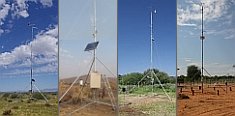|
|||||||||||||
 |



Weather data

A large number of automatic weather stations has been implemented in the frame of the BIOTA AFRICA project by the Namibian National Botanical Research Institute (NBRI) and the Group "Biodiversity, Evolution and Ecology" (BEE) of the University of Hamburg. The website offers hourly updates of data and graphs of a large number of weather parameters.

|
< back Subproject S11Subproject Coordination: Prof. Dr. Michael Kirk,
Philipps-University Marburg, Department of Economics,
Institute for Co-operation in Developing Countries, Am Plan 2, 35032 Marburg, Germany
|
|
It is the general aim of S11 to investigate the human impact on biodiversity with respect to the general human use of savannahs and specific use of natural pastures for grazing of domestic animals; to look for more appropriate and adaptive farming technologies, in particular, relating to the need for more suitable management practices; and to inform policy makers about options for biodiversity monitoring and management for a better understanding of causal links and policy options. Moreover, our approach considers the anthropological background of communities, their livelihood strategies and farming systems; the integration of resource evaluation; relevant institutional as well as policy aspects, while incorporating various modelling and management systems. A close collaboration and strong integration of socio-economic and natural science research themes is targeted at, while a joint research agenda is aimed at so as to acquire further scientific knowledge on integrating themes such as the understanding of the human impact on biodiversity and policy interventions for sustainable resource use. Results from the first phase indicate that an overstocking of many natural pastures, partly uncoordinated and inefficient range and herd management systems exist due to a set of influencing factors. Weak institutional frameworks encourage open access and external effects as well as tenure insecurity (especially land rights), which in turn provide disincentives for investments by resource users. All future efforts will specifically concentrate on the further integration of economical-, institutional- and ecological models, to provide policy makers with options for biodiversity monitoring and management. Workpackages: WP1 WP2 WP3 WP4 WP5 WP6 |



|
 Go to the WeatherNet
Go to the WeatherNet